|
|
|
Sort Order |
|
|
|
Items / Page
|
|
|
|
|
|
|
| Srl | Item |
| 1 |
ID:
164651


|
|
|
|
|
| Summary/Abstract |
This article demonstrates the role and importance of EU agencies in the EU’s regulatory environment, and considers the consequences of an absence of cooperation through agencies for internal security. It does so by exploring the case study of the anti-counterfeiting activities of the European Union Intellectual Property Office (EUIPO), and what happens when a state no longer benefits from membership of an EU agency. The effective protection of consumers from counterfeit goods is dependent upon identifying best practices, sharing information on counterfeiting trends, and coordinating responses, activities undertaken through EU agencies. This article demonstrates that the ability of states to effectively counter the sale of counterfeit goods is dependent upon the existence of EU agencies due to the need for transnational cooperation. In the absence of EU agencies, states are likely to suffer diminished operational expertise and a lack of in-depth knowledge concerning counterfeiting trends. It concludes that the EU agencies form an essential part of EU security governance, with states not party to these cooperative endeavours rendered vulnerable and unable to combat at a national level what is ultimately a global problem.
|
|
|
|
|
|
|
|
|
|
|
|
|
|
|
|
| 2 |
ID:
187080
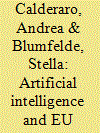

|
|
|
|
|
| Summary/Abstract |
EU Digital Sovereignty has emerged as a priority for the EU Cyber Agenda to build free and safe, yet resilient cyberspace. In a traditional regulatory fashion, the EU has therefore sought to gain more control over third country-based digital intermediaries through legislative solutions regulating its internal market. Although potentially effective in shielding EU citizens from data exploitation by internet giants, this protectionist strategy tells us little about the EU’s ability to develop Digital Sovereignty, beyond its capacity to react to the external tech industry. Given the growing hybridisation of warfare, building on the increasing integration of artificial intelligence (AI) in the security domain, leadership in advancing AI-related technology has a significant impact on countries’ defence capacity. By framing AI as the intrinsic functioning of algorithms, data mining and computational capacity, we question what tools the EU could rely on to gain sovereignty in each of these dimensions of AI. By focusing on AI from an EU Foreign Policy perspective, we conclude that contrary to the growing narrative, given the absence of a leading AI industry and a coherent defence strategy, the EU has few tools to become a global leader in advancing standards of AI beyond its regulatory capacity.
|
|
|
|
|
|
|
|
|
|
|
|
|
|
|
|
| 3 |
ID:
116687
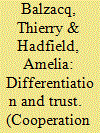

|
|
|
|
|
| Publication |
2012.
|
| Summary/Abstract |
One recent but major policy occurrence in Justice and Home Affairs - the Treaty of Prüm (2005) - has developed within the framework of differentiated integration, thus reopening the debate over the impact of flexibility on EU integration, what causes it, and whether it should be sought by Member States at all. Whatever the consensus, the debate itself demonstrates that the very idea of differentiated integration deserves a renewed attention today ultimately because it affects, in one way or another, the performance of the EU. This article presents a critical analysis of the practice of differentiation in Justice and Home Affairs, by examining its forms, principles and effects. It discusses the literature on the subject, emphasizing the complexity of flexible integration, but reaches different conclusions. Thus, in contrast to the dominant argument, we argue that differentiation is not necessarily about deepening and/or widening EU integration. It is also, and sometimes primarily, about power and interests, two major elements that feed mistrust among Member States. In fact, we demonstrate that mistrust can cause poor differentiation. Moreover, in the absence of trust among Member States, flexibility might contribute to sub-optimal policies. Based on past research and interviews, we substantiate our claim by investigating the driving factors, rationales and consequences of the Treaty of Prüm on the institutionalization of a EU area of Freedom, Security and Justice.
|
|
|
|
|
|
|
|
|
|
|
|
|
|
|
|
| 4 |
ID:
118004
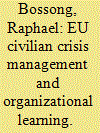

|
|
|
|
|
| Publication |
2013.
|
| Summary/Abstract |
Commentators and policy-makers stress the need to learn the lessons of EU civilian crisis management. Yet despite numerous case studies on mission performance, we know little about the EU's overall capacity for such learning. The first part of this article outlines a theoretical framework for analyzing organizational learning in the context of peace operations. It recommends focusing on administrative reform and conceptual development in Brussels, and lists various factors that are expected to facilitate or inhibit organizational learning cycles. On this basis, the second part presents a historical survey of the EU's learning efforts in civilian crisis management. Despite a dynamic expansion of mission tasks as well as corresponding review processes, organizational learning has remained haphazard and limited to capacity expansion or mission support requirements. Only since 2009 did the EU invest in more formalized lessons-learning processes, which led to more systematic information gathering and more in-depth conceptual discussions. So far, however, these initiatives could not overcome political constraints to more ambitious reforms of EU peace operations.
|
|
|
|
|
|
|
|
|
|
|
|
|
|
|
|
| 5 |
ID:
120827
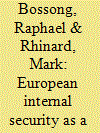

|
|
|
|
|
| Publication |
2013.
|
| Summary/Abstract |
This introduction argues for a new research agenda on European internal security cooperation from the perspective of public goods. We set out our case in three parts. First, we identify new empirical puzzles and demonstrate significant explanatory gaps in the existing internal security literature which public goods theory could help address. Second, we outline the building blocks of a public goods approach and provide an overview of its application, both existing and potentially, in various areas of regional security and European integration. Third, we present three complementary ways of using public goods theory to analyse internal security in the European Union, with the aim of spurring new research questions while accepting some limitations of this theoretical approach.
|
|
|
|
|
|
|
|
|
|
|
|
|
|
|
|
| 6 |
ID:
183714
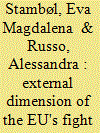

|
|
|
|
|
| Summary/Abstract |
The article constitutes the first comprehensive review of the EU's export of crime control policies and ‘aid to internal security’ across regions over the last 15 years. Drawing on both International Relations and criminology, it develops an analytical framework to identify the political rationalities and technologies of crime control that the EU attempts to transfer across the Eastern and Southern (extended) neighbourhoods. By scrutinising 216 projects aimed at combating transnational crime beyond Europe's borders, spanning law enforcement, border security, criminal justice, and the penitentiary sector, the empirical analysis is geared towards detecting and systematising the ways of thinking and doing crime control that the EU seeks to promote and export. Moreover, it investigates the ‘action at a distance’ whereby it does so. It is argued that in shaping third countries’ ability to criminalise, police, indict, convict, and punish, the EU is simultaneously defining its own security actorness, specifically consolidating its role as a ‘global crime fighter’.
|
|
|
|
|
|
|
|
|
|
|
|
|
|
|
|
| 7 |
ID:
116686
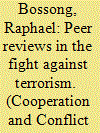

|
|
|
|
|
| Publication |
2012.
|
| Summary/Abstract |
This article analyses EU peer reviews in the fight against terrorism, which constitute a significant and previously unstudied instrument of European security governance. The first part reviews some general features of security governance and outlines two analytical perspectives to assess the effect of peer reviews in this context, namely compliance and learning. The second part surveys the historical development and substantive impact of the EU's peer reviews on the fight against terrorism. Although the first peer review after the attacks of 9/11 was slow to unfold, it eventually came to be regarded as a highly successful exercise that improved mutual trust and the coherence of the European fight against terrorism. It was therefore followed by a second peer review on consequence management in response to terrorist attacks. From a critical perspective, the article argues that the impact of these peer reviews could be doubted from both compliance and learning perspectives, as monitoring and flanking measures have remained too weak. The conclusions raise further avenues for research on peer reviews that are a regular feature of EU security governance.
|
|
|
|
|
|
|
|
|
|
|
|
|
|
|
|
| 8 |
ID:
180565
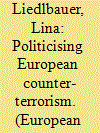

|
|
|
|
|
| Summary/Abstract |
The article examines the role of NGOs in the politicisation of EU security. The focus of the empirical analysis lies on the field of EU counter-terrorism. The cases selected are two different types of legal acts, adopted in the aftermath of serious terrorist attacks in EU member states: The EU data retention directive and the EU passenger name record (PNR) directive. These policies present intrusiveness and relevance for Brussels-based and national civil rights NGOs since they both aim to touch upon individual liberties, like privacy rights or the right to protect personal data. The article goes further by opening up the black box of politicisation. It does so by assuming that politicisation is characterised by a certain level of salience, actor range and polarisation. The paper links politicisation literature to research on the influence of interest groups that are discussing, for example, voice, access or litigation as strategies. Therewith, the paper contributes to the scientific debate on politicisation in two ways: First, it sheds light on the so far disregarded role of NGOs in politicisation. Second, it builds a bridge to interest group literature by examining repertoires of NGOs in politicisation.485-503
|
|
|
|
|
|
|
|
|
|
|
|
|
|
|
|
| 9 |
ID:
120832
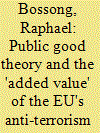

|
|
|
|
|
| Publication |
2013.
|
| Summary/Abstract |
This contribution analyses the EU's fight against international terrorism from the perspective of public goods theory. The first part develops an improved conceptualisation of collective action problems in this issue area, and presents a typology of related security goods according to different aggregation technologies (weaker links, summation, better shots). The second part embeds this theoretical framework in the European context, and presents an empirical survey of the EU's anti-terrorism efforts. It is argued that the EU has been comparatively effective in responding to 'weaker' link vulnerabilities, even if implementation records are uneven and boundaries of security cooperation remain unclear. In contrast, the EU could not effectively aggregate resources and act jointly in the international fight against terrorism. Due to the non-excludable nature of benefits (as in the case of foreign policy) or partial rivalry of consumption (as in the case of sensitive information), concerns with free-riding and crowding remain significant obstacles to collective action. Finally, the EU increasingly supports better shot efforts to develop new instruments and technologies to combat terrorism, but may be left behind by mini-lateral initiatives of its most capable member states.
|
|
|
|
|
|
|
|
|
|
|
|
|
|
|
|
|
|
|
|
|